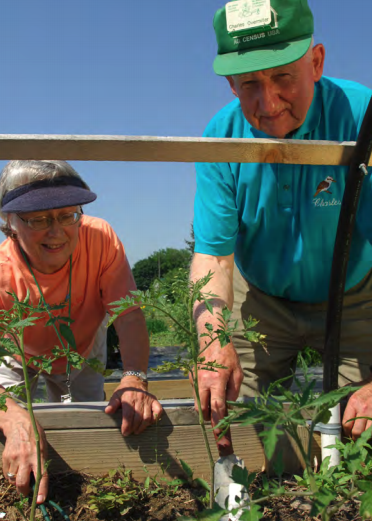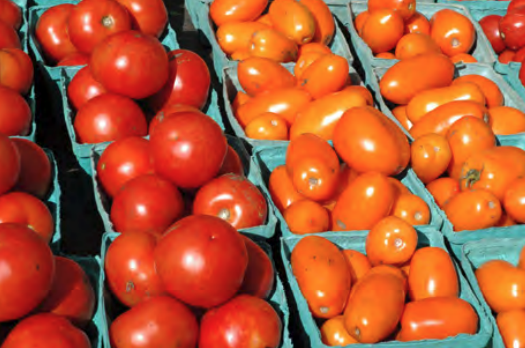
Fact Sheets And Publications
Consider a Vegetable Garden This Year
By Maggie Moor-Orth, Tracy Wootten (Delaware State University)
& Carrie Murphy (University of Delaware)
Have you thought about growing a small vegetable garden for you and your family? Have you thought about growing your own food? What about being such a good gardener you could share the extra produce with neighbors, friends and/or donate to your local food bank? Have you hesitated because you think it is too difficult? What a thrill it is to harvest a squash for a dinner casserole or cucumber for your salad. Vegetable gardening is very rewarding and can be accomplished with some helpful tips.
There are different ways to accommodate anyone who wants to garden. This raised bed allows people to garden at a more comfortable height.

Considerations for your garden site
How much time do you have to plant, weed and harvest in your garden?
- A small garden is best for beginners. Go bigger as your skills and time increase.
- Do you have a sunny spot? Most vegetables require 6 to 8 hours of sunlight.
- Vegetables prefer loose, well drained soil; rich in organic matter (compost).
- Avoid low spots on your property where water may sit after a rain.
- How much usable space is available?
- For convenience, a short walk from your house to the garden is ideal.
- Try to be close to a water outlet. You will need water to establish your plants, and especially during flowering and drought periods.
- Avoid buildings and tall trees that create shade over the garden area.
- Select an area that does not have established plants nearby, they will compete with the available nutrients and water your vegetable plants will need.
- Take a soil sample from the area, six weeks before planting (most vegetables prefer a pH of 6.0 – 6.8).
- Will you grow your plants in raised beds or in the ground?
Considerations for choosing what to plant
- How many people are in your family to feed from the garden?
- What vegetables are you or your family’s favorites?
- What are you going to do with the harvested produce?
- In addition to using your fresh harvested vegetables, do you plan to freeze, can, store or donate the extras?
- Were you going to participate in the Plant a Row for the Hungry Program, then donate to your local food bank?

Other considerations for planting
- Remember you can start a vegetable garden in the spring or fall.
- Warm season plants (tomatoes, peppers, melons, etc.) are planted about May 10.
- Cool season plants (collards, kale, cauliflower, cabbage, etc.) are planted in mid/late August.
- Ideally rows should run north and south, for maximum sun exposure on all plants.
- If your rows run east to west, place tall crops on the north side to ensure the taller, caged or trellised plants don’t shade shorter crops.
Easy garden crops
Cool Season Crops will germinate in cooler soil temperatures and are hardy or frost tolerant. Warm season crops are tender and need warm temperatures to grow (some are very tender and will not grow at cool temperatures).
Below are some easy to grow cool and warm season crops:
Easy Cool Season Crops:
Hardy
(seeds germinate at soil temperatures of 35-40 degrees F )
- asparagus
- kale
- broccoli
- onion
- brussel sprouts
- peas
- cabbage
- spinach
- greens
- swiss chard
Half Hardy
(will tolerate light frost/freezes) (seeds germinate at soil temperatures of 40-45 degrees F)
- beet
- carrot
- cauliflower
- lettuce
- potato
Easy Warm Season Crops:
Tender
(seeds germinate at soil temperatures of 50-55 degrees F)
- sweet
- corn
- snap
- beans
- tomato
Very Tender
Plant after the last danger of frost , Mother’s Day, approximately May 10 (seeds germinate at soil temperatures of 60 degrees F).Get a head start on the season – start these plants indoors
- cantaloupe
- cucumber
- eggplant
- lima beans
- squash
- sweet potato
- pepper
- pumpkins
- watermelon
Consider a Vegetable Garden This Year is a publication of Delaware Cooperative Extension, a partnership between Delaware State University and the University of Delaware. For more information, contact Delaware Cooperative Extension at (302) 857-6426 or (302) 730-4000 (Kent County); (302) 831-8862 (New Castle), or (302) 856-2585/ext. 535 (Sussex County).
UD Cooperative Extension
This institution is an equal opportunity provider.
In accordance with Federal law and U.S. Department of Agriculture policy, Cooperative Extension is prohibited from discriminating on the basis of race, color, national origin, sex, age, or disability.
